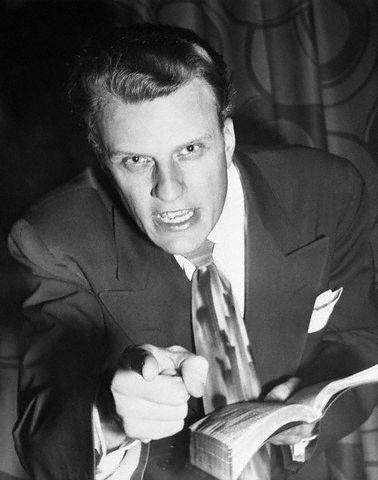I found this information at the Lifehouse Church website. It is something that I think every Ministry Leader should read. You can click HERE to to see the information in it's original form. I copied it directly from the website.
Modesto Manifesto
(A plan for holiness)
Perhaps no other leading church figure of the past 50 years commands as much admiration and respect from both the Christian and non-Christian world as does the Rev. Billy Graham. While he has suffered some criticism over the years, no scandals have rocked his ministry - and it has been intensely scrutinized. One of the major reasons Reverend Graham and his associates have avoided pitfalls and scandal goes back to November of 1948 and what took place in a hotel room in Modesto, California. It was there The Modesto Manifesto was birthed.
Graham and his associates, Bev Shea, Grady Wilson, and Cliff Barrows, were just starting to get involved in evangelistic meetings. At the time, many traveling evangelists were crossing the country. And a number fell to scandals - moral, ethical and financial. In a desire to see their ministry remain above scandal, the men met to discuss the problems evangelists faced. They came up with four problems to avoid and ways to avoid them.
1. Money
It was common practice among evangelists to put a lot of emotion and flourish into taking love offerings. This could bring unnecessary criticism - and temptation. The men vowed not to emphasize the offering. To avoid criticism they would always have the local campaign committees oversee the offerings and disbursements of funds - they would accept a straight salary regardless of how high the offerings were.
2. Immorality
Religious leaders especially those who traveled were regularly falling to this temptation. The men agreed continually to pray for God to guard them from it. They also set up some rules to follow. They would never allow themselves to be alone with women - lunches, counseling sessions, or rides to auditoriums or airports. And they would always get their hotel rooms close together as another safeguard.
3. Exaggeration
The phrase evangelistically speaking has been coined to label exaggerated figures of the number attending meetings or the number saved. The men vowed not to fall to this practice. If numbers were mentioned they were the ones generated by the local police, fire departments, or arena managers.
4. Criticism.
Often evangelists would criticize local pastors and churches from pulpits. The men vowed not to do this, nor would they ever criticize pastors who openly criticized them.
Now back to me! As the article above noted, this Manifesto was written in 1948. Look at the timelessness of these four simple things. How many strong ministries have been crippled by Money, Immorality, Exaggeration, and Criticism? Too many. I'm going to make sure that I always have a copy of this somewhere. I would advise the same for any ministry leader.
Peace and Love,
Rev. Mike










Great article. Their motto was "Don't touch the girls, don't touch the gold, don't touch the glory". They lived up to all three, by His grace.
ReplyDeleteGood words. Sometimes you have to be harder on yourself than the people.
ReplyDeletegreat manifesto.. and yes, righteiousness is timeless
ReplyDeleteBy the way, that first picture of Billy Graham is from the 1940s (even earlier than you suggested).
ReplyDeleteCliff Barrows has said that as their success and fame grew in the early years, Billy frequently reminded his team, "Don't touch the glory." It wasn't one of the original points of the so-called Modesto Manifesto, but it soon became another standard that Billy and his team adopted -- never claim credit for the souls won and deflect all praise to God.
ReplyDeleteThanks for the comments all. I wonder how people reacted to his success and the crowds back then. I think about today's mega church leaders and the amount of scrutiny that they are under. It just makes me wonder who followed Billy Graham around waiting for him to mess up.
ReplyDeleteKinda shows us how much the church has changed in not so many years. Not a lot of respect for Almighty God.
ReplyDeleteMost are adopting Rick Warren's "dress down for God" theology and "bring your McDonalds breakfast with you to the service" mentality.
Your newest follower.
@ Covnitkepr1 - You just read Billy Graham's statement on the downfalls of evangelists (but we can apply this to any Christian really). One of these was the criticism of other churches, and your immediate reaction to this statement is to criticize a whole bunch of churches?
ReplyDeleteMaybe you should read it again.